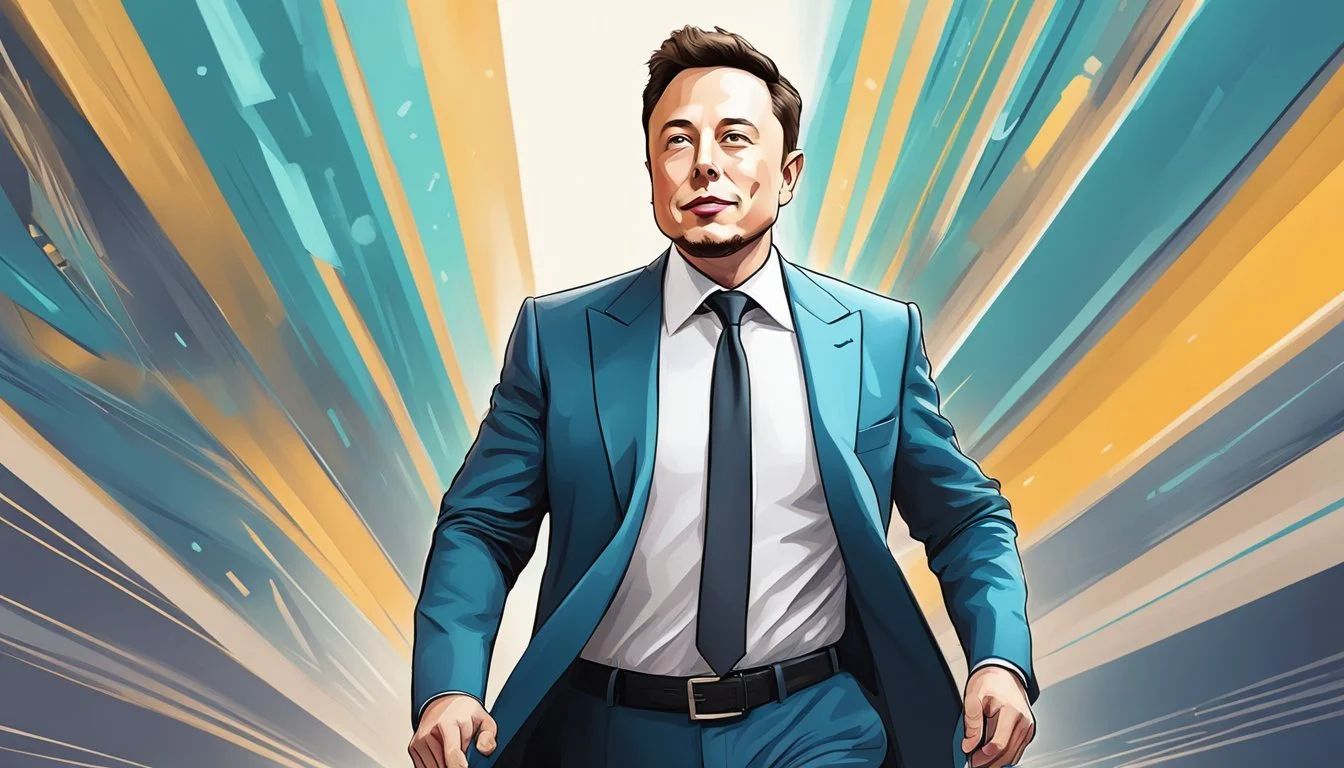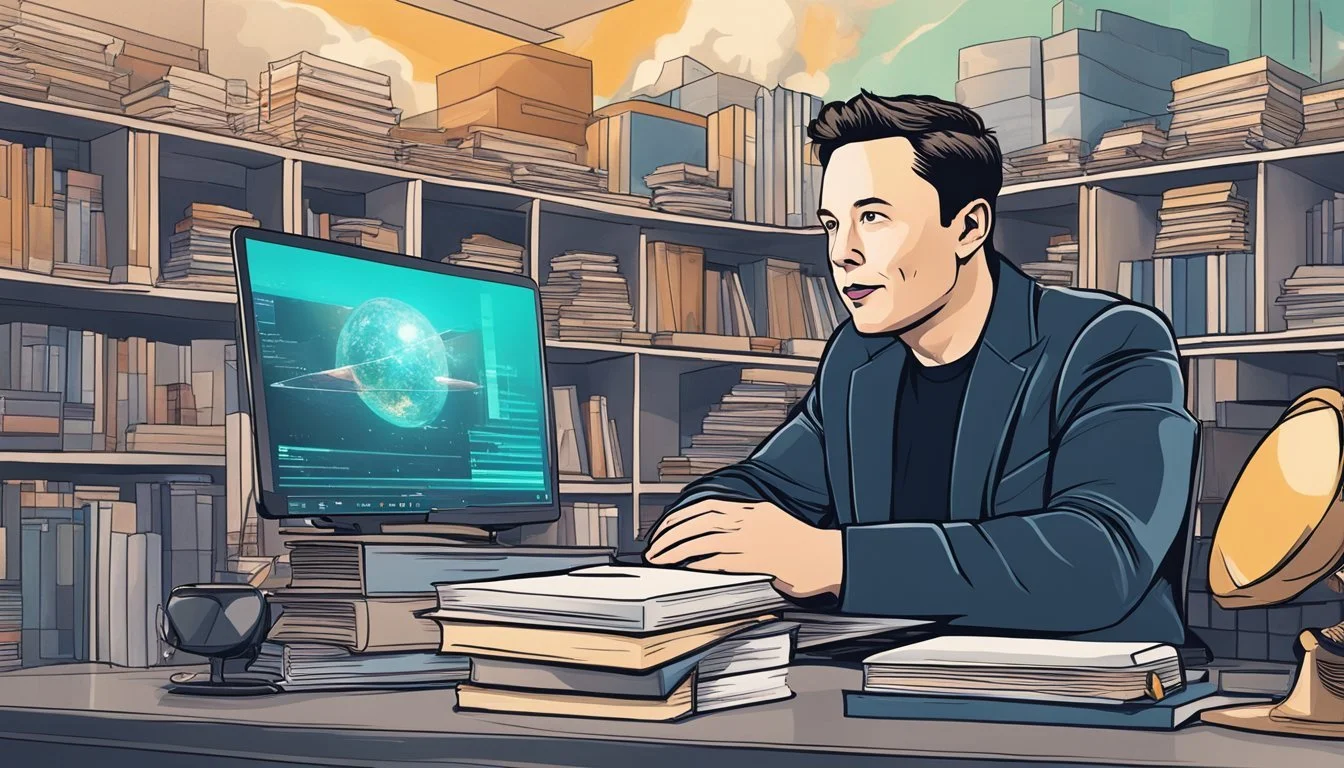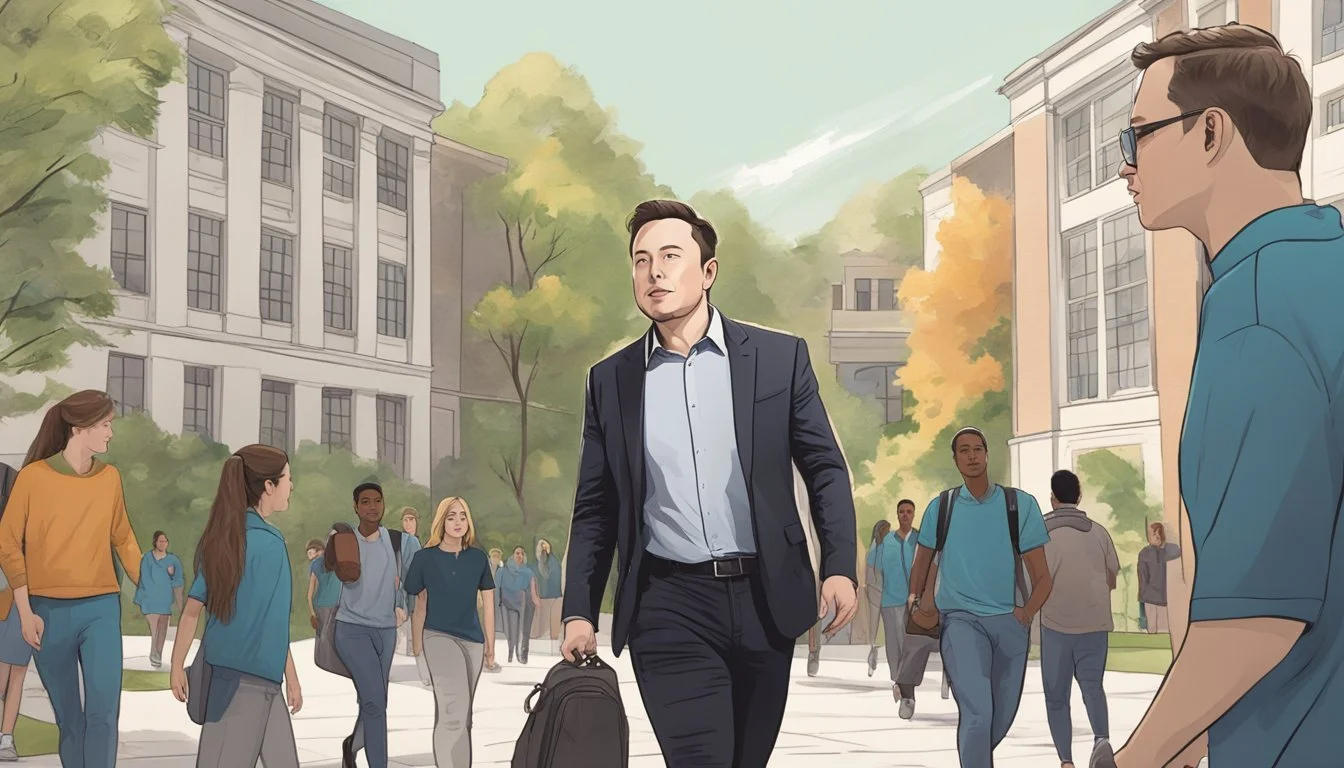Exploring Elon Musks Academic Journey
A Brief Look at His Educational Journey
Elon Musk's educational journey is as fascinating as his entrepreneurial career. The tech mogul's path to academic success began in South Africa and led him to prestigious institutions in North America.
Elon Musk attended the University of Pennsylvania, where he earned bachelor's degrees in physics and economics. Before UPenn, Musk spent two years at Queen's University in Ontario, Canada. His pursuit of knowledge didn't stop there; he briefly enrolled in a Ph.D. program at Stanford University, focusing on energy physics and materials science.
Musk's college experiences laid the groundwork for his future innovations. The combination of physics and economics studies at UPenn provided a unique perspective that would later influence his approach to entrepreneurship and technological advancements. Although he left Stanford after just a few days to pursue his entrepreneurial ambitions, the brief time there sparked ideas that would shape his future endeavors.
Early Life and Education
Elon Musk's formative years were split between South Africa and Canada, shaping his educational journey and future pursuits. His early experiences and academic choices laid the foundation for his later accomplishments in technology and business.
Birthplace and Childhood in South Africa
Elon Musk was born on June 28, 1971, in Pretoria, South Africa. As a child, he displayed an aptitude for technology and computers. Musk taught himself computer programming at a young age, demonstrating his natural inclination towards STEM fields.
His early education took place in South Africa. Musk was known as a quiet, studious child who spent much of his time reading. He consumed encyclopedias after exhausting the book collections at local libraries.
Musk's photographic memory allowed him to retain vast amounts of information. This trait would prove valuable in his later academic and professional endeavors.
Emigration to Canada and Education at Queen's University
In 1989, at the age of 17, Musk made a significant move by emigrating to Canada. This decision was motivated by his desire to avoid mandatory military service in South Africa and to pursue higher education opportunities abroad.
Musk enrolled at Queen's University in Kingston, Ontario. He spent two years studying at this institution, marking the beginning of his post-secondary education in North America.
Queen's University provided Musk with a foundation in various subjects. However, his time there was relatively brief. After two years, Musk transferred to the University of Pennsylvania in the United States to continue his studies.
This transition marked a pivotal point in Musk's educational journey, setting the stage for his future academic pursuits and eventual entrepreneurial success.
University Education and Degrees
Elon Musk pursued his undergraduate studies at the University of Pennsylvania, earning two bachelor's degrees simultaneously. His academic focus spanned both scientific and business disciplines, reflecting his diverse interests and aptitudes.
Bachelor of Science in Physics
Musk completed a Bachelor of Science in Physics at the University of Pennsylvania's School of Arts and Sciences. This rigorous program provided him with a strong foundation in theoretical and applied physics. The curriculum likely included courses in mechanics, electromagnetism, quantum mechanics, and thermodynamics.
Physics training honed Musk's analytical skills and deepened his understanding of fundamental scientific principles. These skills would later prove invaluable in his technological ventures, particularly in aerospace and energy sectors.
Bachelor of Arts in Economics
Concurrently, Musk earned a Bachelor of Arts in Economics from the prestigious Wharton School of Business at the University of Pennsylvania. This degree equipped him with essential business and financial knowledge.
The economics program covered microeconomics, macroeconomics, finance, and market analysis. Musk's economics education complemented his scientific background, providing crucial insights into business operations and market dynamics.
This dual-degree combination uniquely positioned Musk at the intersection of technology and business, laying the groundwork for his future entrepreneurial successes.
Brief Enrollment at Stanford University
Elon Musk's time at Stanford University was brief but significant. His enrollment in the prestigious institution marked a pivotal moment in his educational journey, though it ultimately led to an unexpected change in direction.
Ph.D. Program and Early Departure
Elon Musk transferred to Stanford University in California to pursue a Ph.D. program in energy physics and materials science. This move aligned with his growing interest in sustainable energy and advanced technologies.
However, Musk's stint at Stanford was remarkably short-lived. He left the doctoral program after just two days, drawn by the allure of the internet boom and entrepreneurial opportunities.
This decision marked a turning point in Musk's career trajectory. Instead of continuing his academic pursuits, he chose to dive into the world of business and technology startups.
Musk's brief enrollment at Stanford exemplifies his willingness to take risks and pivot when presented with new opportunities. While he didn't complete the Ph.D. program, the knowledge and connections gained during his time there likely contributed to his future success in the tech industry.
Ventures after University
Elon Musk's post-university career began with groundbreaking ventures in the tech and financial sectors. His early startups laid the foundation for his future success and established him as a visionary entrepreneur.
Foundation of Zip2 Corporation
In 1995, Musk co-founded Zip2 with his brother Kimbal. The company provided online city guides and maps for newspaper publishers. Zip2 quickly gained traction during the early days of the internet boom. Major clients included The New York Times and Chicago Tribune. Musk's innovative approach to digital content delivery attracted significant investor interest. In 1999, Compaq acquired Zip2 for nearly $300 million. This sale marked Musk's first major financial success, netting him $22 million at age 27.
Creation and Sale of X.com and PayPal
Riding the wave of the internet boom, Musk founded X.com in 1999. This online banking company merged with Confinity in 2000 to form PayPal. The platform revolutionized online payments, becoming a key player in e-commerce. Despite internal conflicts, PayPal grew rapidly. In 2002, eBay acquired PayPal for $1.5 billion. Musk, as the largest shareholder, received $165 million from the sale. This windfall provided crucial funding for his future ventures in space exploration and sustainable energy.
Elon Musk's Technological Ventures
Elon Musk has spearheaded multiple groundbreaking companies that have revolutionized space exploration, electric vehicles, and renewable energy.
SpaceX: Advancing Space Exploration Technologies
SpaceX, founded by Musk in 2002, aims to reduce space transportation costs and enable the colonization of Mars. The company has achieved several milestones, including:
• First privately funded liquid-propellant rocket to reach orbit (Falcon 1) • First private company to successfully launch, orbit, and recover a spacecraft (Dragon) • First private company to send a spacecraft to the International Space Station
SpaceX's reusable rocket technology has significantly lowered launch costs. The Falcon 9 and Falcon Heavy rockets have completed numerous successful missions, while Starship is under development for future Mars missions.
Tesla, Inc: Revolutionizing Electric Vehicles
Tesla, with Musk as CEO since 2008, has transformed the automotive industry by popularizing electric vehicles. Key achievements include:
• Launch of the Roadster (2008), Model S (2012), Model X (2015), Model 3 (2017), and Model Y (2020) • Development of advanced battery technology and autonomous driving capabilities • Creation of a extensive Supercharger network for convenient long-distance travel
Tesla's focus on innovation has pushed other automakers to accelerate their electric vehicle programs, contributing to a global shift towards sustainable transportation.
SolarCity and the Pursuit of Renewable Energy
SolarCity, co-founded by Musk's cousins with his support, became a major player in solar energy before merging with Tesla in 2016. The company's contributions include:
• Pioneering the solar-as-a-service model, making solar panels more accessible to homeowners • Developing the Solar Roof, integrating solar cells directly into roof tiles • Advancing battery storage technology for homes and businesses
This merger allowed Tesla to offer integrated sustainable energy solutions, combining solar power generation, energy storage, and electric vehicles.
Other Innovative Projects
Elon Musk's entrepreneurial spirit extends beyond his well-known ventures into groundbreaking projects that aim to reshape transportation and human-computer interaction.
The Boring Company: Aiming to Alleviate Traffic
The Boring Company, founded by Musk in 2016, focuses on developing high-speed underground transportation systems. Its primary goal is to reduce urban congestion through innovative tunnel construction techniques.
The company's flagship project is the Loop system, which uses electric vehicles to transport passengers through narrow tunnels at high speeds. A notable example is the Las Vegas Convention Center Loop, completed in 2021.
The Boring Company also explores Hyperloop technology, a proposed ultra-high-speed transportation system using vacuum tubes. This concept could potentially revolutionize long-distance travel, with theoretical speeds exceeding 700 mph.
Neuralink: Merging AI with the Human Brain
Neuralink, co-founded by Musk in 2016, is developing brain-computer interface technology. The company's ambitious goal is to create implantable brain-machine interfaces to enhance human cognitive abilities and treat neurological conditions.
Neuralink's core technology involves ultra-thin threads containing electrodes, which can be implanted in the brain to read and potentially stimulate neural activity. The company has demonstrated its progress through animal trials, including a monkey playing video games using only its mind.
Future applications of Neuralink's technology could include treating conditions like paralysis, blindness, and mental health disorders. The project also aims to explore human-AI symbiosis, potentially allowing direct neural control of digital devices.
Impact on Technology and Business
Elon Musk's education and entrepreneurial drive laid the foundation for his significant influence on technology and business. His ventures have reshaped multiple industries and pushed the boundaries of innovation.
Influence in the Tech Industry
Musk's companies have revolutionized several sectors. SpaceX disrupted the space industry by developing reusable rockets, significantly reducing launch costs. This innovation opened new possibilities for space exploration and satellite deployment. Tesla transformed the automotive industry by making electric vehicles desirable and commercially viable. The company's success accelerated the global shift towards sustainable transportation.
Musk's work in artificial intelligence, through companies like Neuralink and OpenAI, has also pushed the boundaries of technology. These ventures aim to develop advanced AI systems and brain-computer interfaces, potentially revolutionizing healthcare and human-computer interaction.
Contributions to Sustainable Energy and Transportation
Tesla's impact extends beyond electric cars. The company's energy division develops solar panels, batteries, and energy storage solutions for homes and businesses. These products contribute to the growth of renewable energy infrastructure and help reduce reliance on fossil fuels.
Tesla's Gigafactories, large-scale production facilities for electric vehicles and batteries, have created thousands of jobs and stimulated local economies. The company's innovations in battery technology have applications beyond automobiles, including grid-scale energy storage.
Musk's Hyperloop concept, a high-speed transportation system, has inspired various projects worldwide. While still in development, this technology could potentially transform long-distance travel and urban transportation.
Personal Life and Influence
Elon Musk's personal life and public persona are closely intertwined with his professional achievements. His relentless work ethic and ambitious vision have propelled him to immense wealth and influence.
Work Ethic and Ambition
Musk is known for his intense work schedule, often putting in 80-100 hour weeks. He sets ambitious goals and pushes himself and his teams to achieve them. In college, Musk took on odd jobs to support himself, including cleaning boilers and cutting wood.
His drive extends beyond work. Musk reads voraciously across various subjects to expand his knowledge. He's not afraid to enter new industries, launching ventures in electric cars, space exploration, and neural technology.
Musk's ambition is evident in his stated goals:
Making humans a multi-planetary species
Accelerating the world's transition to sustainable energy
Developing safe artificial intelligence
Public Life and Wealth
Elon Musk's net worth fluctuates but often exceeds $150 billion, making him one of the world's wealthiest individuals. His wealth comes primarily from his stakes in Tesla and SpaceX.
As a public figure, Musk is active on social media, particularly Twitter. His tweets have significant influence, sometimes affecting stock prices and cryptocurrency values.
Musk's personal life attracts media attention. He's been married three times and has fathered ten children. His romantic relationships, including with celebrities, often make headlines.
His controversial statements and business decisions frequently spark public debate. Musk's acquisition of Twitter in 2022 for $44 billion thrust him further into the spotlight.








